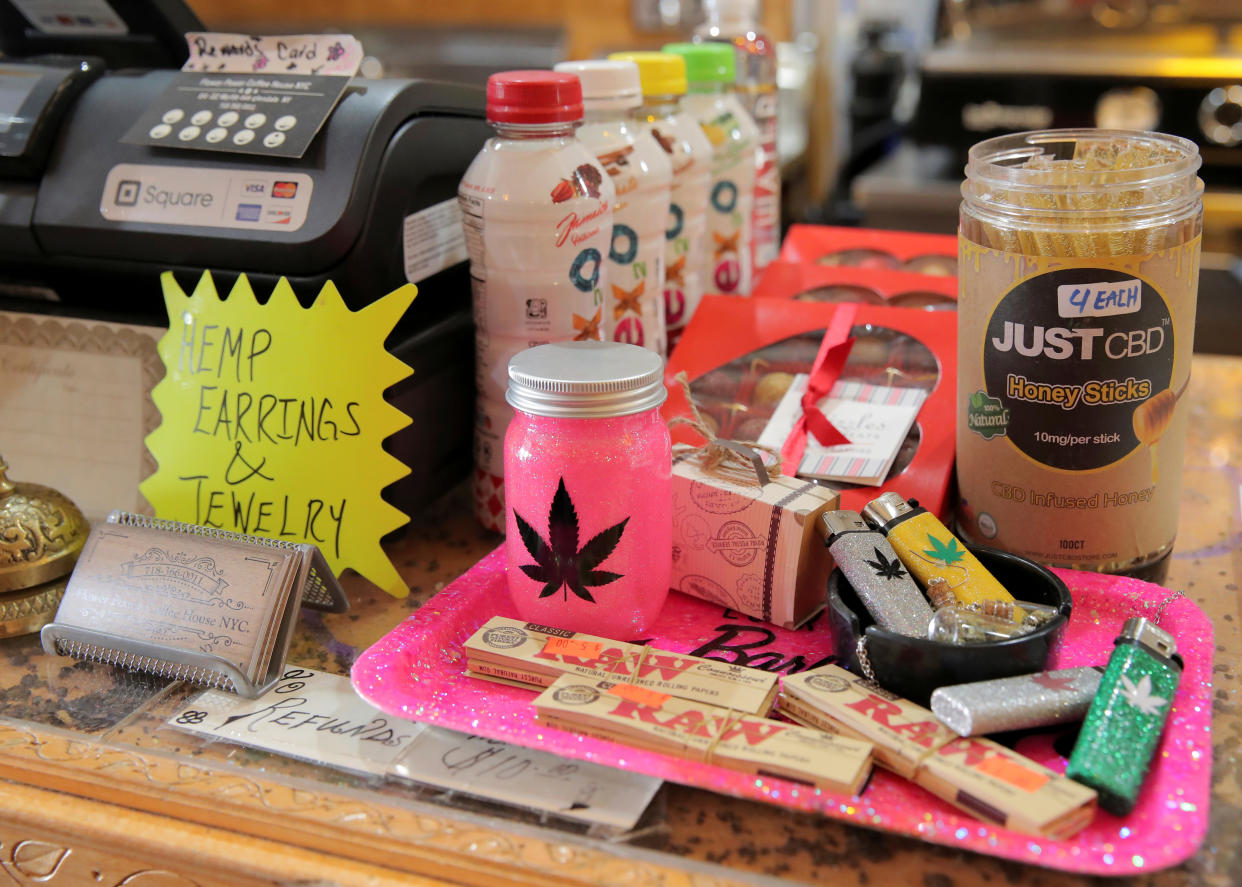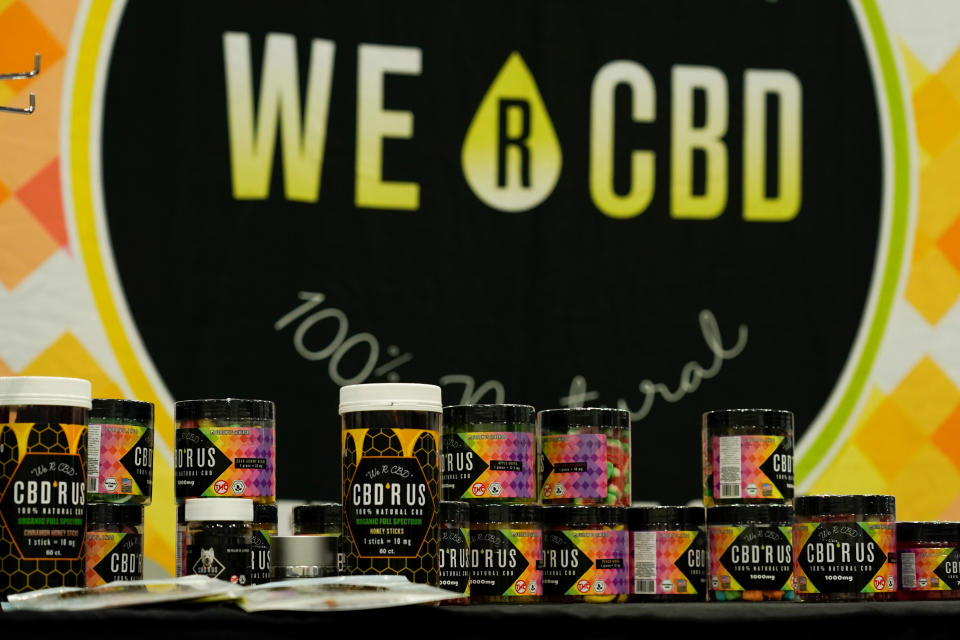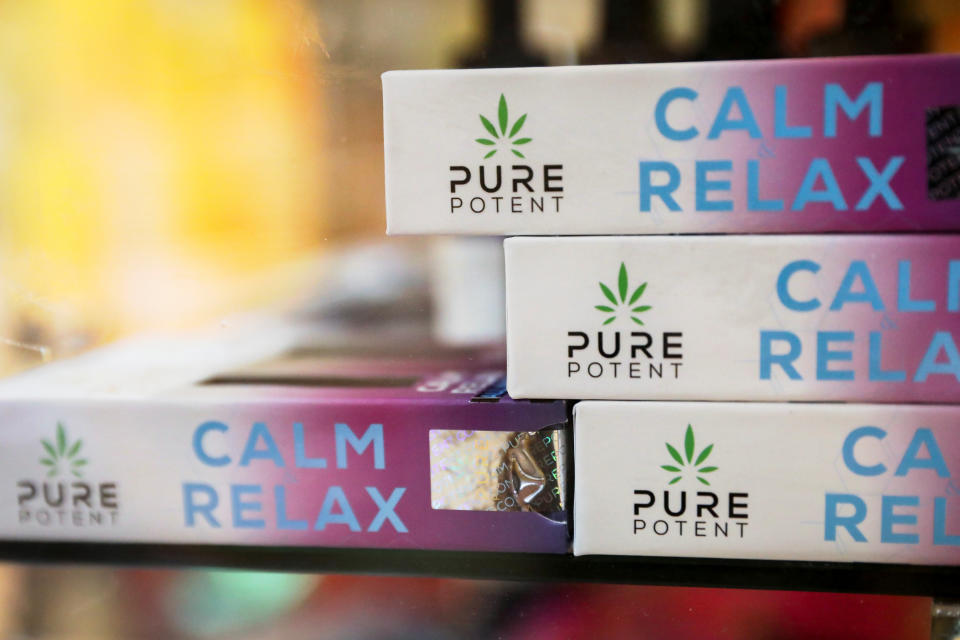CBD entrepreneurs vie to position their products as 'real deal'

CBD is everywhere — it’s showing up in major pharmacies, high-end department stores, and even local coffee shops — despite the fact that the cannabis chemical and the elixirs containing it are unregulated and hardly created equal.
A recent survey conducted on October 1 by Grocery Manufacturers Association estimated that 34% of American adults have purchased CBD-infused products, yet 76% incorrectly presumed that the federal government was regulating them, while 16% were uncertain. Another survey, published in August by BDS Analytics, found that 56% of U.S. adults surveyed did not understand one of the main differences between CBD and THC, in that CBD is non-psychoactive and does not make users “high.”
Amid the confusion, consumers are nonetheless willing to spend on CBD-containing concoctions and experiment with their potential to treat pain, inflammation, skin disorders, anxiety, depression, neurological damage, epilepsy, and PTSD. This year, the U.S. CBD market, is estimated to outpace 2018 by 706%, growing to $5 billion, according to the Brightfield Group.
Last year, the most popular categories included ingestibles ($883.5 million), topicals ($491.2 million), inhalables ($395.4 million), and pet products ($63.8 million), according to BDS. By 2024, BDS projects the market to swell to $20 billion.
The U.S. Food and Drug Administration has warned that CBD should not be marketed to treat anxiety, pain, PTSD, various pet ailments, and other conditions. To date, the FDA has also banned CBD from inclusion in foods and drinks introduced into interstate commerce. That leaves cosmetic and topical manufacturers with the most leeway to get their products in front of U.S. retailers, even though annual sales of ingestibles in 2018 outpaced topical sales by more than $300 million.
What should consumers look for in a CBD product?
With a lack of regulation, some CBD entrepreneurs are seeking to educate consumers and distinguish their products from their competitors.
“The very first thing would be to see if they actually state what the CBD concentration is, how many milligrams are in the product,” Dr. Andrew Kerklaan, a chiropractor and entrepreneur who entered the topical CBD market in 2013, told Yahoo Finance about how buyers should evaluate CBD. Kerklaan first began studying CBD in response to patients seeking his expertise on pain relief. “If you can't find that anywhere, then I would be suspicious as to how much [CBD] it had, and whether it even had any.”
Nearly every entrepreneur in the still-nascent cannabis industry is quick to advise that brand — and most likely their own — is the number one method for consumers to identify quality CBD.

While brands may present compelling cases, lining up celebrity endorsements and strategic distribution channels, Olympic and professional athlete’s nods of approval fail to arm buyers with the information they need to shop as informed consumers.
Kerklaan’s five-year-old Canadian company, Dr. Kerklaan Therapeutics, which manufactures a line of CBD skin creams, on Monday announced a global expansion of new placements in major retailers, including luxury U.K. department store, Selfridges, duty free retailer DFS North America, Dillard’s (DDS) department stores and South African CBD retailer, Goodleaf.
When asked to assume brand blindness, Kerklaan said the next item on a CBD buyer’s checklist should be to review how the company or product describes its CBD.
“So, right now, hemp is the word for the crop,” he said. In other words, hemp is merely a reference to the plant from which the CBD came. “Some people are trying to confuse hemp, and hemp seed oil, with CBD product.” According to Kerklaan, any CBD product should specifically reference CBD. “If you look in its ingredients and it's talking about hemp seed oil, it’s not a CBD product,” he explained.
Also potentially misleading are product labels that reference cannabis sativa, yet contain only hemp seed oil.
“They have really nothing to do with cannabinoids, or cannabis, or or CBD,” Kerklaan said, adding that, at a minimum, a clear list of ingredients should be available, with CBD among them.

Casey Georgeson, founder and CEO of Saint Jane Beauty, whose CBD beauty line launched this year in Saks Fifth Avenue, Barneys and Sephora, told Yahoo Finance in April she’s sold on the efficacy of CBD to enhance skin, and that consumers who try her brand can see the results for themselves.
“We're CBD, the real deal, not a brand that will work with cannabis sativa oil and call it CBD,” she said. “There are a lot of brands right now that are capitalizing on that confusion, and I think it's causing consumers to really be confused.”
Georgeson’s products, like the rest of the CBD topicals already on the market, have not undergone clinical trials, but her company is taking steps to study anecdotal evidence. CBD molecules added to Saint Jane’s products, she said, are tested five times before they are made available for sale to ensure that the CBD milligrams listed on product labels are accurate.
“We are also making sure that we're testing pesticides and residual solvents, and heavy metals, and THC level,” she said, explaining that such testing and assurances should be part of a consumer’s standards for purchasing CBD.
‘Infused in every product you know of today’
What makes CBD a difficult product for consumers to evaluate is that as a result of the federal government’s prior prohibition of hemp and continued prohibition of marijuana, both which produce CBD, its impact on users’ health is understudied. Randomized control trials to prove effectiveness of CBD are lacking, Kerklaan said.

“The basic science has certainly been progressing along, so there are a lot of studies out there, looking at cannabinoids and their effect as anti-inflammatories, and effect as potential painkillers, even antimicrobial and a long list of things,” he said.
Despite the lack of clinical conclusions, and today’s reliance on anecdotal evidence, CBD, at minimum, is known to contain familiar nutrients.
“We know that CBD as a molecule is the same molecule whether it's derived from very THC-rich marijuana or derived from hemp. It's like H2O — it’s a molecule that doesn't change,” Georgeson said. “It is very rich in nutrients, and so we know that it's got more antioxidants and vitamin C and vitamin E. And we know CBD is most known for reducing inflammation.”
Saul Kaye, a retail pharmacist and angel investor who founded iCAN, an Israeli incubator focused on the medical cannabis industry and accelerating early-stage cannabis technology, told Yahoo Finance he envisions CBD going the way of vitamins D and E.
“CBD will be infused in every product you know of today,” he said. “Ten years ago, we learned we can measure vitamin D deficiency — someone came up with a way to measure it in the blood. And it turns out, everyone's deficient, and within six months, we had vitamin D milk.”
Kaye also cautions that there’s a tendency for consumers to think of cannabis derivatives as binary: CBC versus THC, or recreational marijuana versus medical marijuana.
“None of it is binary,” he said, explaining that hundreds of molecules are known to work synergistically, and CBD is no exception. “There's a gray area because a consumer will go ... to try something new, and realize, oh, that helped.”
“I don't think isolate CBD is the answer to anything,” Kaye said.
Odds are, he’s right. University of Vermont professor of pharmacology, Wolfgang Dostmann, who researches cannabinoid effects on brain receptors, told Yahoo Finance in January that the research community has identified 140 to 150 known cannabinoids, along with CBD and THC.
So far, only one CBD product has been approved by the FDA for a specific use —Epidiolex, a drug that in 2018 gained approval to treat seizures for certain forms of epilepsy.
“I do think retailers understand they are in a gray part of the market. They’re still looking for more guidance,” Kerklaan said. Some, he said, are now looking for CBD products to be manufactured in a CGMP facility, which are facilities that meet the FDA’s minimum requirements for the methods, facilities, and controls used in manufacturing, processing, and packing of a drug product.
Alexis Keenan is a reporter for Yahoo Finance and a former litigation attorney. Follow her on Twitter @alexiskweed.
Read the latest financial and business news from Yahoo Finance.
Follow Yahoo Finance on Twitter, Facebook, Instagram, Flipboard, SmartNews, LinkedIn, YouTube, and reddit.

